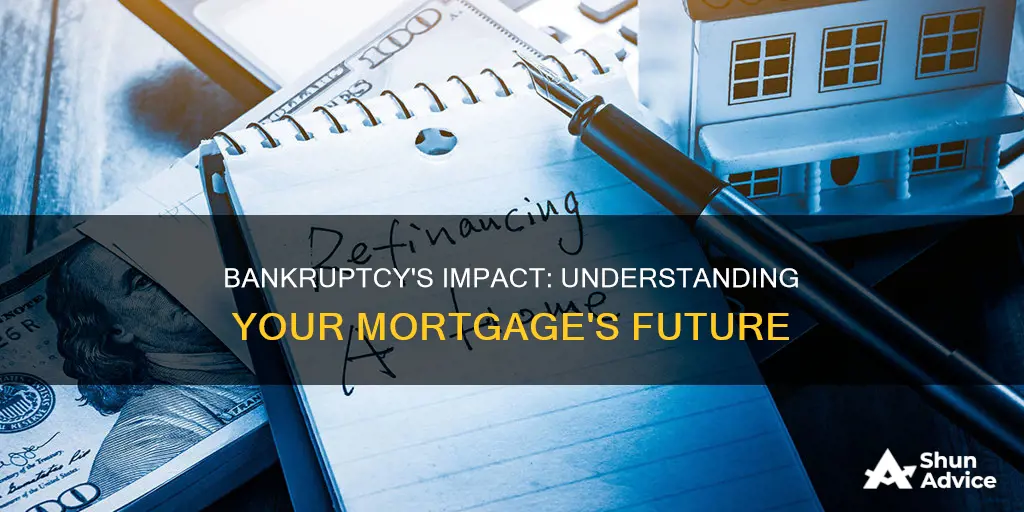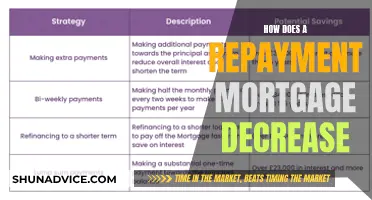
Bankruptcy is a challenging time, especially if you're worried about losing your house. The good news is that you don't automatically lose your home if you file for bankruptcy, and it doesn't accelerate your loan or make it due immediately as long as you've been making payments on time. However, bankruptcy can have a significant impact on your mortgage, and the best way to keep your home is to reaffirm your mortgage debt. The type of bankruptcy you file for matters, with Chapter 7 and Chapter 13 being the most common. Chapter 7 involves selling off non-exempt assets to pay creditors, while Chapter 13 allows you to create a repayment plan. Your ability to remain in your home depends on your state's laws, the type of bankruptcy you file, and your ability to rebuild your credit score.
How does bankruptcy affect mortgage?
| Characteristics | Values |
|---|---|
| Losing your house | You don't automatically lose your house when filing for bankruptcy. |
| Loan acceleration | Filing for bankruptcy does not automatically accelerate the loan or make it due immediately, as long as you have been making payments on time. |
| Chapter 7 bankruptcy | Your existing property will be deemed exempt or non-exempt. Exempt means you can keep the property throughout the bankruptcy process, as long as you can catch up and stay current on your payments. |
| Chapter 13 bankruptcy | You may not lose your property. When you submit your bankruptcy repayment plan, it should include details of how you plan to repay your mortgage. |
| Liens | Lenders place a lien on your property when you take out a mortgage. A lien is a right or interest in the property that the lender has until the debt is paid in full. |
| Bankruptcy and liens | Even though some debts are forgiven during bankruptcy, existing liens on your property are still subject to foreclosure. |
| Reaffirming debt | You can reaffirm your mortgage debt by renegotiating an agreement with the creditor. The debtor promises to pay back all or some of the money owed, and the creditor promises not to foreclose on the property. |
| Foreclosure | Failure to make your monthly mortgage payments will still result in foreclosure, even if you filed for bankruptcy or agreed to reaffirm. |
| Credit score | Bankruptcy will impact your credit score and make it challenging to get approved for a new mortgage. |
| Waiting period | It can take one to four years after your bankruptcy discharge to become eligible for a mortgage. |
What You'll Learn

Chapter 7 bankruptcy and losing your home
Chapter 7 bankruptcy can be a challenging process, especially if you're concerned about losing your home. While it is possible to keep your home during Chapter 7 bankruptcy, there are several important factors to consider. Firstly, let's understand the role of exemptions and how they can impact your ability to keep your home.
Exemptions and Home Equity
Exemptions play a crucial role in determining whether you can keep your home. In bankruptcy law, exemptions allow you to protect a certain amount of your property value from creditors. When it comes to home equity, exemptions can help you safeguard your home's value, ensuring that it is not sold to repay your debts. Calculating your home equity is a critical step, as it helps determine the extent to which bankruptcy laws will protect it. You can calculate your home equity by subtracting the amount owed for mortgages, loans, and liens from the property's value.
State Laws and Exemptions
It's important to note that state laws vary, and some states offer unlimited exemption amounts. For example, Florida's homestead rights protect your primary residence from creditors if you've lived there for several years, provided the property doesn't exceed a size limit. Consult with a bankruptcy attorney to understand the specific exemptions available in your state.
Current Mortgage Payments
To keep your home during Chapter 7 bankruptcy, it's essential to stay current on your mortgage payments. If your mortgage payments are not up to date, the lender can use its lien rights to foreclose on your home after the bankruptcy case closes or even during the case if they receive court approval. Therefore, maintaining timely payments is crucial to prevent foreclosure.
Reaffirming Your Mortgage Debt
Reaffirming your mortgage debt is an option to consider if you want to keep your home. Reaffirmation involves renegotiating an agreement with the creditor, where you promise to repay some or all of the debt in exchange for the creditor's promise not to foreclose on the property. Reaffirmation agreements are voluntary and must be approved by the court, ensuring they are in your best interest and will not impose undue hardship.
Chapter 13 as an Alternative
If you're struggling to keep your home under Chapter 7 bankruptcy, Chapter 13 bankruptcy offers a more favourable option. Chapter 13 provides a repayment plan that allows you to catch up on missed payments and manage your debt over three to five years. It can help you avoid foreclosure and provides a better chance of retaining your home.
In summary, while Chapter 7 bankruptcy may result in losing your home, there are ways to mitigate this risk. Understanding exemptions, staying current on mortgage payments, and exploring alternatives like Chapter 13 bankruptcy can help you navigate this challenging process while protecting your home.
Lawsuits and Mortgages: What You Need to Know
You may want to see also

Chapter 13 bankruptcy and keeping your home
Chapter 13 bankruptcy can be a way to keep your home and stop foreclosure proceedings. This chapter of the Bankruptcy Code allows individuals with regular income to keep their property and repay their debts over a period of three to five years. This means that, unlike Chapter 7 bankruptcy, you can make up your missed mortgage payments over time, rather than losing your home.
To file for Chapter 13 bankruptcy, you will need to complete credit counselling and develop a debt repayment plan. You will also need to pay various fees, including attorney fees, trustee fees, a case filing fee, and an administrative fee. Your repayment plan will need to show that you can make monthly payments while also keeping up with all other necessary expenses.
During your Chapter 13 repayment, you will need to stay on top of your regular mortgage payments, as well as catching up on any overdue payments. This can be complicated if you have multiple loans or a second mortgage on your home. However, if you can demonstrate that your equity doesn't cover what you owe on a second mortgage, that debt may be removed from your home and treated as credit card debt.
While Chapter 13 bankruptcy can help you keep your home, it is important to note that it will also result in a significant drop in your credit score, making it more difficult to get approved for loans or even jobs in the future. Additionally, bankruptcy is not free, and you will need to pay fees to the trustee to cover their operating costs.
Mortgage Servicers: Making Money by Managing Your Home Loan
You may want to see also

Bankruptcy exemptions and how they vary by state
When filing for bankruptcy, you can protect your property from creditors by using bankruptcy exemption laws. These laws allow filers to "exempt" or protect property needed to work and live. While bankruptcy exemption laws vary from state to state, some common exemptions across states include essential items, such as household furnishings, some home and car equity, and a retirement account.
In some states, filers must affirmatively claim certain exemptions, such as the homestead exemption, while in other states, exemptions are automatic. The homestead exemption protects your ownership interest in your home, allowing you to keep some equity in a residential home. It's important to note that homestead exemptions typically don't cover rental properties or investment properties. Additionally, there may be a requirement to live in the home for a certain period before filing for bankruptcy.
Some states, known as "opt-out" states, restrict their residents to using only state exemptions. These states do not allow the use of federal bankruptcy exemptions. Examples of such states include Delaware, Florida, and Alabama. On the other hand, some states provide filers with a choice between using state or federal bankruptcy exemptions. For instance, Arkansas allows filers to choose between the two, although they cannot mix exemptions from each set.
The availability of federal bankruptcy exemptions depends on the state in which you file for bankruptcy. These exemptions are outlined in the U.S. Bankruptcy Code and are available to anyone filing for bankruptcy, regardless of the state. However, each state has the right to opt out of these exemptions, requiring filers to use only state exemptions. If you have the option to choose between state and federal exemptions, you must select one list and cannot mix and match items from both.
Exploring Connecticut's Mortgage Landscape: What You Need to Know
You may want to see also

Getting a mortgage after bankruptcy
Bankruptcy can be a challenging and emotional time, especially if you're faced with losing your home. While getting a mortgage after bankruptcy is difficult, it's not impossible. Here are some things to keep in mind if you're considering getting a mortgage after bankruptcy:
Types of Bankruptcy
There are two main types of bankruptcy: Chapter 7 and Chapter 13. Chapter 7 bankruptcy involves the liquidation of your assets to repay your outstanding debt. This type of bankruptcy usually stays on your credit report for up to 10 years and can result in the loss of your home. On the other hand, Chapter 13 bankruptcy allows you to create a repayment plan to catch up on past-due mortgage payments and avoid foreclosure. This type of bankruptcy typically remains on your credit report for seven years. It's important to understand which type of bankruptcy you have filed or plan to file, as it will impact the waiting period for getting a mortgage.
Waiting Periods
After bankruptcy, you will need to wait for a certain period before applying for a mortgage. The waiting period varies depending on the type of mortgage and the type of bankruptcy. For a conventional mortgage, you may need to wait two to four years after Chapter 7 bankruptcy and one to two years after Chapter 13 bankruptcy. For FHA or VA loans, the waiting period is typically one to two years, while for a USDA loan, it's one to three years. It's important to check with lenders about their specific requirements and waiting periods.
Credit Score and Financial Health
Bankruptcy can significantly impact your credit score and financial health. During the waiting period, focus on rebuilding your credit and improving your finances. This includes budgeting, saving for a down payment, and managing your money effectively. Review your credit report regularly and work on improving your credit score. Lenders will want to see that you are financially stable and capable of making repayments.
Mortgage Options
When considering a mortgage after bankruptcy, explore different options and choose the one that best suits your situation. Government-backed loans, such as FHA, VA, and USDA loans, tend to have more lenient requirements and shorter waiting periods. Non-QM (non-qualified mortgage) loans are another option, but they typically come with higher interest rates and down payment requirements.
Lender Requirements
Be prepared to provide all the necessary legal paperwork and documentation to lenders. They may require a letter of explanation detailing why you filed for bankruptcy and the improvements you've made since then. Be honest and transparent throughout the process.
Deposits and Proof: Getting Your Mortgage Application Approved
You may want to see also

Bankruptcy and your credit score
Bankruptcy is a legal proceeding that offers relief to those unable to meet their debt obligations. It is a last resort for those who cannot afford to repay their debts, and while it can be the best financial decision in certain circumstances, it can have a severely negative impact on your credit score. This impact will depend on your entire credit profile, and the type of bankruptcy you file for.
Chapter 7 bankruptcy, also known as liquidation bankruptcy, involves selling some of your assets to pay off your debts. This type of bankruptcy will remain on your credit report for up to 10 years and can result in an immediate drop of 100-200 points in your credit score. It is important to note that Chapter 7 bankruptcy does not remove a mortgage lien if the lender has foreclosed on your home, and you may still be required to make up any missed payments. Additionally, unless you can claim an exemption, you must give up your home to have the remaining debt discharged.
Chapter 13 bankruptcy, on the other hand, is a "reorganization" option that allows you to set up a repayment plan to pay back your creditors over a specific period, typically three to five years. This type of bankruptcy will affect your credit score for seven years and can also result in a significant drop in your credit score. However, it is important to note that Chapter 13 bankruptcy can help homeowners catch up on past-due mortgage payments and avoid foreclosure.
Regardless of the type of bankruptcy, the negative impact on your credit score can diminish over time, especially if you actively work to rebuild your credit. This can be done by monitoring your credit score, sticking to a budget, and paying your bills on time.
Understanding the Components of a Mortgage Note
You may want to see also
Frequently asked questions
You don't automatically lose your house if you file for bankruptcy. Whether you file for Chapter 7 or Chapter 13 bankruptcy, you may be able to keep your home if it is exempt from bankruptcy and you are current on your mortgage payments. If your home is non-exempt, you may have to surrender it or pay its value in cash.
Chapter 7 bankruptcy, also known as "liquidation" bankruptcy, involves selling off non-exempt assets to pay creditors. Chapter 13 bankruptcy, on the other hand, is known as "reorganisation" bankruptcy, allowing you to create a repayment plan to pay back creditors over three to five years.
Yes, it is possible to get a mortgage after bankruptcy, but it may take some time. The waiting period depends on the type of bankruptcy you filed for, the financial institution, and how long it takes to rebuild your credit score. For example, you may need to wait at least four years after your discharge date for a conventional mortgage, while an FHA or VA loan may only require one to two years.







